Demand for rental property is literally going through the roof—and we can play the trend for a rock-solid 7% dividend that can be had at a discount!
What’s driving this opportunity? Higher interest rates. As you can see below, the average 30-year mortgage issued today bears an interest rate near 5%, a level we haven’t come close to since the subprime-mortgage crisis.
Mortgage Rates Soar
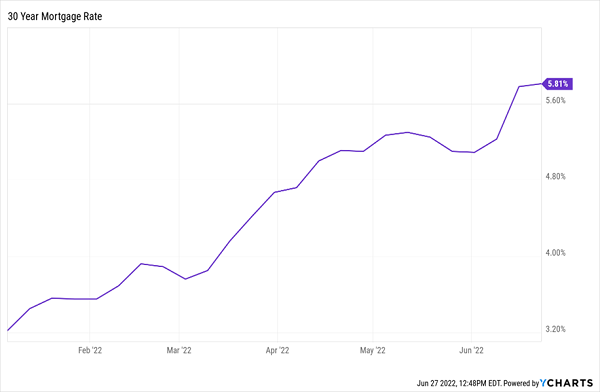
The trend is so aggressive that it’s getting analysts and journalists into full-blown panic mode, as they begin to report on what I call “seller’s remorse.”
Seeing how rates are soaring and home values are hitting a bump, sellers are already reducing their asking prices and looking to offload property as fast as possible. Barron’s called these sellers “anxious” in a recent article, while the Los Angeles Times notes that buyers are taking a pause, and the “market is not the same” as it once was for sellers.
The Red-Hot Rental Market
As owners rush to sell, they’ll have to live somewhere, as will folks who are still priced out of the market as rising rates drive up the cost of homeownership. That’s a boon for the rental market, where vacancy rates are falling as rents rise.
Fewer Vacancies = More Rental Income
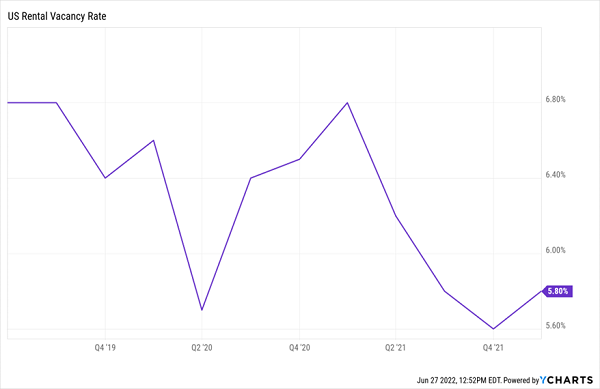
The question for investors is how to tap this trend. The obvious way is to buy a rental property yourself. But there are many disadvantages here. For one, if you have to finance it, you’re looking at more of the rent you collect going toward mortgage interest.
In addition, you’ll have the other headaches landlords must deal with, like complaining tenants, the need to chase down rent checks and possible legal risks—not to mention the concentration risk of being dependent on a single property.
The (far!) simpler option is to invest through publicly traded real estate investment trusts (REITs) that own residential properties, such as Invitation Homes (NYSE:INVH). The REIT owns 80,000 single-family homes in 16 markets, giving you diversification across residential real estate.
High demand for Invitation’s properties has caused its stock to nearly double in five years.
Big Profits With Diversified Real Estate
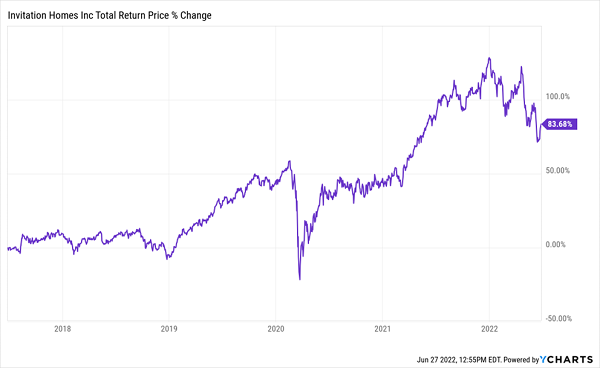
That pullback you see on the right of the chart above—an overblown 20% decline year to date—makes now a great time to pick up INVH and be on the landlord’s side as more Americans pivot from buying to renting.
Kicking REIT Dividends Into Overdrive
There’s a catch, though: you’re starting out with a pretty low yield—just 2.4%—because investors have bid up Invitation’s price to such a degree that it has offset the 175% increase in the dividend over the last five years (because yields and prices move in opposite directions).
What’s more, even with the stock’s decline this year, it trades at a price-to-adjusted-funds-from-operations ratio (P/AFFO) of 24. That’s high for a REIT, but I’d say it’s still fair for one with this much success behind it. (The P/AFFO ratio is similar to the P/E ratio used for stocks but is REIT-specific.)
Still, INVH’s 13.5% annualized total return over the last half decade tells us it’s a strong REIT, but just not one we can buy solely for income, due to its low payout.
What we really want is a fund that holds INVH and other, similar REITs while translating some of its portfolio REITs’ capital gains into dividends for us.
Enter closed-end funds (CEFs) like the Cohen & Steers Quality Income Realty Fund (NYSE:RQI). RQI, which holds INVH alongside many other high-quality REITs, yields 7% and has an incredible track record, crushing the average REIT by a huge margin, going by the performance of the benchmark SPDR Dow Jones REIT ETF (NYSE:RWR), in orange below.
Big Dividends and Profits
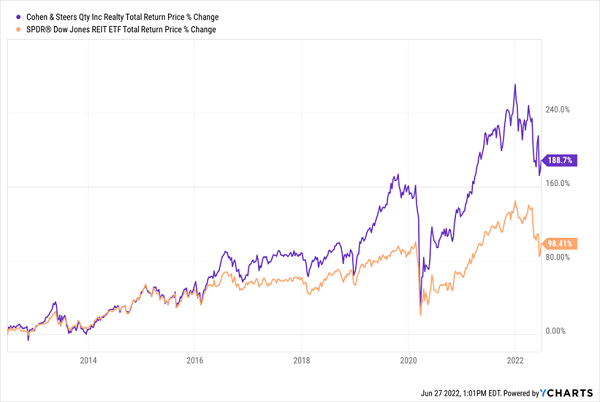
RQI booked this strong performance because it’s managed by a team of real estate professionals and Wall Street veterans. The fund is also highly diversified, buying REITs from across the economy, so you’re getting exposure to thousands of properties in many industries. And RQI’s managers are adept at rotating out of overpriced REITs and into bargain REITs when they’re particularly oversold—this has been the key to the CEF’s strong performance.
The fund then hands these gains, along with the dividends generated by its portfolio, to us in the form of its rich 7% dividend.
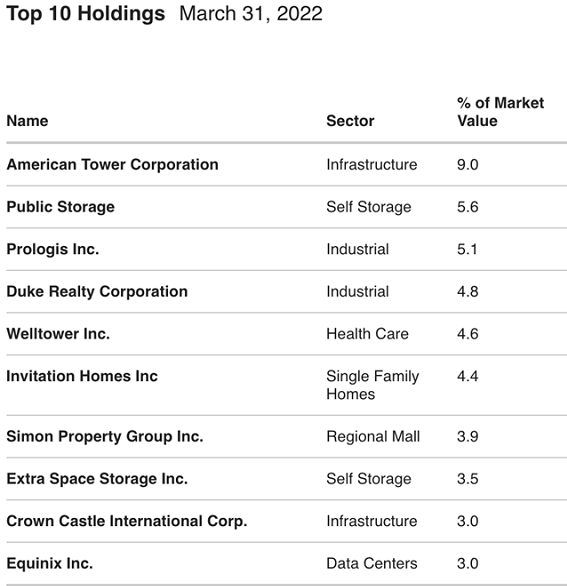
Source: Cohen & Steers
As you can see above, the fund’s top-10 holdings are distributed across REIT sectors that are in high demand (in addition to the residential sector), like cellphone towers, through American Tower (NYSE:AMT) and Crown Castle International (NYSE:CCI); warehouses, which are still benefiting from high demand for goods, through names like Prologis (NYSE:PLD) and Duke Realty (NYSE:DRE); and data centers, through firms like Equinix (NASDAQ:EQIX).
As I write this, you can buy RQI for a 6% discount to net asset value (NAV, or the value of its portfolio). So in essence, you’re paying just 94 cents on the dollar for these great companies.
The kicker? RQI pays dividends monthly, so its payouts arrive right in line with your bills.
Disclosure: Brett Owens and Michael Foster are contrarian income investors who look for undervalued stocks/funds across the U.S. markets. Click here to learn how to profit from their strategies in the latest report, "7 Great Dividend Growth Stocks for a Secure Retirement."
